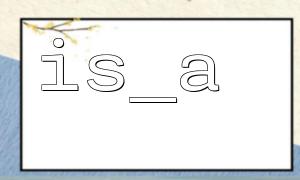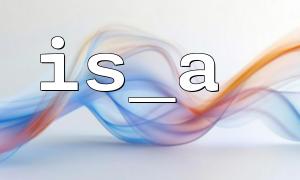이벤트 중심 아키텍처는 최신 PHP 응용 프로그램을 구축 할 때 일반적인 디커플링 방법입니다. 시스템의 특정 작업에 대한 이벤트를 정의한 다음 청취자가 이러한 이벤트에 응답합니다. 여러 이벤트 유형이 청취자를 공유하는 시나리오에서 청취자가 이벤트를 처리 해야하는지 여부를 어떻게 우아하게 결정합니까? 이것이 바로 is_a () 함수가 기술을 보여줄 수있는 곳입니다.
이 기사는 IS_A () 함수를 사용하여 이벤트 기반 배포 메커니즘을 구현하는 방법을 보여 주므로 청취자가 "관리"이벤트 유형 만 처리합니다.
먼저 기본 이벤트 인터페이스 및 여러 특정 이벤트를 정의합니다.
interface EventInterface {}
class UserRegisteredEvent implements EventInterface {
public string $username;
public function __construct(string $username) {
$this->username = $username;
}
}
class OrderPlacedEvent implements EventInterface {
public int $orderId;
public function __construct(int $orderId) {
$this->orderId = $orderId;
}
}
그런 다음 리스너 인터페이스와 특정 리스너를 정의합니다.
interface EventListenerInterface {
public function handle(EventInterface $event): void;
public function isInterestedIn(EventInterface $event): bool;
}
class SendWelcomeEmailListener implements EventListenerInterface {
public function handle(EventInterface $event): void {
if (!$event instanceof UserRegisteredEvent) return;
// 여기에 이메일을 보내는 논리가 여기 있다고 가정하십시오
echo "사용자에게 환영 이메일을 보내십시오:{$event->username}\n";
}
public function isInterestedIn(EventInterface $event): bool {
return is_a($event, UserRegisteredEvent::class);
}
}
isinterestedin () 메소드는 유형 판단을하기 위해 사용하는 장소입니다. IS_A ()를 사용하여 들어오는 이벤트가 리스너의 관심 유형인지 여부를 결정합니다.
다음으로, 우리는 모든 청취자를 통해 반복하고 기준을 충족하는 리스너를 호출하는 간단한 이벤트 유통 업체를 구현합니다.
class EventDispatcher {
/**
* @var EventListenerInterface[]
*/
private array $listeners = [];
public function addListener(EventListenerInterface $listener): void {
$this->listeners[] = $listener;
}
public function dispatch(EventInterface $event): void {
foreach ($this->listeners as $listener) {
if ($listener->isInterestedIn($event)) {
$listener->handle($event);
}
}
}
}
이제이 분배기를 다음과 같이 사용할 수 있습니다.
$dispatcher = new EventDispatcher();
$dispatcher->addListener(new SendWelcomeEmailListener());
$userEvent = new UserRegisteredEvent('Alice');
$orderEvent = new OrderPlacedEvent(1001);
$dispatcher->dispatch($userEvent);
// 산출:사용자에게 환영 이메일을 보내십시오:Alice
$dispatcher->dispatch($orderEvent);
// 没有산출,청취자가 있기 때문입니다 OrderPlacedEvent 관심이 없습니다
is_a () 함수 사용에는 다음과 같은 장점이 있습니다.
Clear Semantics : 유형을 판단하고 있음을 직접 설명합니다.
지원 상속 : 객체가 클래스 또는 하위 클래스의 인스턴스인지 판단 할 수 있으며, 이는 다형성 이벤트 구조를 처리하는 데 매우 적합합니다.
높은 유연성 : 여러 청취자가 다양한 유형의 이벤트 를 듣도록 쉽게 지원할 수 있습니다.
실제 프로젝트에서는 청취자가 구성에 관심이있는 이벤트 유형을 선언하기를 원할 수 있습니다. 현재 이벤트 클래스 이름을 리스너의 문자열로 저장 한 다음 is_a () 와 비교할 수 있습니다.
class DynamicListener implements EventListenerInterface {
private string $interestedClass;
public function __construct(string $interestedClass) {
$this->interestedClass = $interestedClass;
}
public function handle(EventInterface $event): void {
echo "이벤트 처리:" . get_class($event) . "\n";
}
public function isInterestedIn(EventInterface $event): bool {
return is_a($event, $this->interestedClass);
}
}
이제 리스너를 동적으로 등록 할 수 있습니다.
$dispatcher->addListener(new DynamicListener(UserRegisteredEvent::class));
$dispatcher->addListener(new DynamicListener(OrderPlacedEvent::class));
IS_A () 함수를 통해 이벤트 리스너의 유형 판단 로직을 우아하게 구현할 수 있습니다. 이벤트 중심 시스템에 대한 명확하고 유연한 이벤트 필터링 메커니즘을 제공하며 특히 다중 이벤트 유형 분배 시나리오에 적합합니다. 복잡한 시스템을 구축 할 때이 모델은 비즈니스 로직을 효과적으로 분리하고 시스템의 유지 관리 및 확장 성을 향상시킬 수 있습니다.













